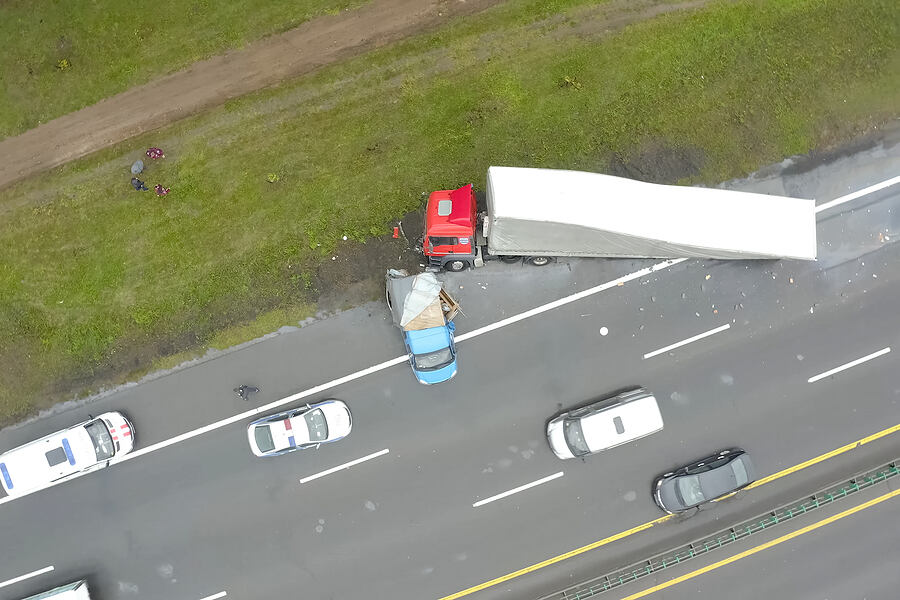Truck accidents happen all around the country, daily. Unfortunately, semi-trucks colliding with cars cause horrific injuries and even wrongful death.
While one may not think a truck driver would flee an accident scene, it does happen. By leaving, the driver not only makes matters worse for him or herself but potentially for others involved in the accident.
Why would a truck driver flee an accident scene?
By driving away, the truck driver is likely at risk for a criminal prosecution, along with losing his license and his employment, and may also face a civil lawsuit.
The driver probably didn’t consider all of that before running from the accident. If the accident was minor, the driver may not have been aware of it.
But in a severe accident, what may have been on his mind was one of a few different things:
- His driver’s license was suspended or expired, or he may never have had one in the first place
- A lack of insurance coverage
- The truck was loaded beyond its limit or contained something illegal
- The truck had not passed a recent inspection
- He was under the influence of drugs or alcohol
If you were involved in a truck accident in which the driver fled the scene, he needs to pay for his actions, and you deserve compensation for your injuries and property damage.
What to do after a hit-and-run truck accident
If you were able to, you probably called 9-1-1. Witnesses or others who came upon the scene did too. This is good. Not only does it get emergency personnel, including paramedics, to the scene quickly, but it also initiates an immediate search for the hit-and-run driver.
Calling emergency personnel also ensures an official police report. When law enforcement appears at the scene, officers will secure the area and quickly collect evidence. They will often take photographs and interview witnesses.
You should seek immediate medical attention. If your injuries warranted it, you were likely taken by ambulance to the nearest emergency department. If not, have someone take you to urgent care or to see your own doctor.
Once you are on the mend, even if you are hospitalized or resting at home:
- Call your insurance company to notify it of the accident
- Do not discuss the details of the accident with anyone other than law enforcement, your doctors, your loved ones, and your attorney
- Write down your accounting of the accident
- Keep records of expenses relating to the accident including medical bills and lost wages
- Follow your doctor’s orders complying with your prescribed treatment plan
- Contact an experienced truck accident attorney
Why you should hire a truck accident lawyer
Although law enforcement was on the scene and may have found the truck driver, who, along with the company he works for, may be liable for your injuries and damages, it’s still wise to hire a truck accident lawyer to handle your legal case. Preparing a lawsuit is no easy task.
Your attorney will likely:
- Offer you a free initial consultation to evaluate your accident and evidence for your potential lawsuit.
- Conduct an independent investigation to identify the driver and the company he works for while collecting further evidence for your case.
- Negotiate a settlement with the defendants for you to receive proper compensation for your damages. If the parties do not agree to your settlement demands, your lawyer should be prepared to take them through a court trial.
What your lawyer will need from you
Do not be concerned if you are not yet well enough to travel to meet a personal injury lawyer. An experienced truck accident attorney should be prepared to meet with you in the hospital, at home, or wherever you may be recuperating from your injuries.
During your initial consultation, you should provide:
- The date, time, and exact location of the accident
- Your verbal and written accounting of the accident
- Any information that may help find the driver if he has not yet been located, including the license plate or partial plate number, any identifying signs on the sides or back of the truck, or the make and model of the truck
- The names and contact information of any witnesses with whom you may have been able to communicate
- A copy of the police report
- A copy of your medical records, including a diagnosis of your injuries, surgeries if needed, and prescribed treatment plan
- Copies of your medical bills
- Copies of estimates or bills for damages to your vehicle
Provide anything else that may come to mind about your accident. While something may seem trivial, your attorney may find it relevant to your case. It is better to provide more than to hold something back.
Who can you sue for a hit-and-run truck accident?
The driver, his employer, and the truck owner could all possibly be liable. In addition, the owner of the truck’s cargo could also be partially responsible.
An experienced truck accident lawyer will be able to figure out just who should be held accountable in your case.
Is there a time limit to file a lawsuit?
Yes. Each state follows its own statute of limitations to file a suit for a personal injury lawsuit, including a truck accident. The length of time varies between one and five years. In Texas, for example, you have up to two years from the date of the accident to file a claim.
But two years is not much time, especially in a hit-and-run case. You should contact and hire your attorney as soon as possible to allow ample time for a thorough independent investigation and preparation of the legal documentation for a lawsuit.
What if the truck driver is not found?
If the driver remains at large, you may still be able to hold the trucking company or a similar party responsible. But if the driver is missing and the name of his employer cannot be found, you may need to seek compensation from your own insurance company. In either event, your attorney can help you pursue the best options for moving forward.


